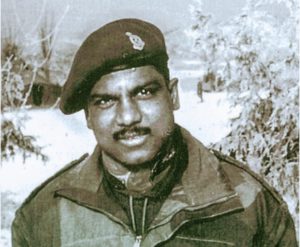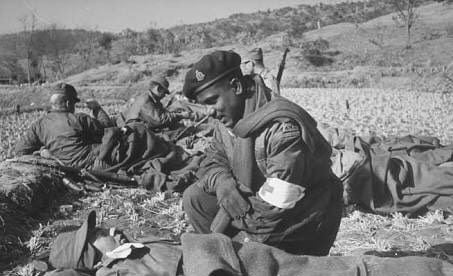70th Anniversary Special: Heroic deeds of Korean War Hero Lt. Col A. G. Rangaraj, remembered
With mounting pressure from advancing Chinese people’s army during the inter-Korean war, Rangaraj’s unit saved the lives of wounded Korean soldiers and crossed the bridge using an abandoned freight train minutes before it was blown up.
NEW DELHI: The history books in India have grossly missed the heroic deeds of the Indian army on offshore locations like the Korean peninsula where a fierce battle between South and North Korean forces supported by allied forces of various nations including India was fought for three years between 1950 and 1953.
As South Korea celebrates the 70th anniversary of the inter-Korean War, the time is ripe to remember the contribution of 60 Para Field Ambulance of the Indian Army led by its commanding officer Lt. Col A. G. Rangaraj who has been named as the Korean War Hero for the month of July 2020 by the Korean Ministry of Patriots and Veteran Affairs.
India too had jumped into the war in a non-combat role in support of South Korea barely three years after it got independent from British colonial rule in 1947 followed by the great partition and ensuing war with Pakistan.

Ambassador Sripriya Ranganathan talking about the contribution of Indian 60 Para Field Ambulance of the Indian Army in the Korean War
“When the war broke out on the Korean peninsula, the experience of the partition of India and first India-Pakistan war very fresh in the minds of the Indian people. India had tried to initiate a ceasefire proposal at the UN Security Council but this didn’t succeed. In June 1950, the UNSC had passed a resolution asking for steps to be taken to repel the armed forces who had invaded from North Korea to South Korea,” said Ambassador Sripriya Ranganathan in South Korea in a YouTube message while talking about the contribution of Indian 60 Para Field Ambulance of the Indian Army in the Korean War. The war broke out on June 25, 1950, and ended on July 27, 1953, but Indian forces remained there till February 23, 1954.
It was at that the government of India also responded by sending the 60th Para Field Ambulance to provide medical support to the friendly people of South Korea.
“Even at that time, the unit was briefed personally by the then Indian Prime Minister Jawaharlal Nehru. The soldiers were made aware of the kind of contribution they were making on behalf of the people of India, and to the South Korean people and to the progressive forces and liberal forces. During the war, it provided assistance to over 225,000 soldiers and Korean civilians. Three members of the unit were killed in action while 23 suffered injuries,” said the ambassador.
She recalls, Indian 60 Papa field hospital arrived in Busan harbor in November 1950, it was split into two echelons, and one was associated with the commonwealth brigade in Pyongyang, while the other was located in Daegu where it was tasked with the creating field hospital and providing training to Korean combat medics.
“In Pyongyang, Lt Col Rangaraj who led his men December 1950 was in dilemma when he had the option of leaving behind wounded people and medical equipment or he had the option of remaining in the battlefield and facing attack from of the advancing forces of the Chinese people’s volunteers army,” she Ranganathan.
She recalls: As it seemed impossible that he would move away and get safe passage, he managed to find the find fourth alternative when members of his unit located a locomotive and some freight cars close by.
 “They managed to get all equipment, medical supplies, and wounded people loaded on to those freight cars and linked up the locomotive and freight cars and drove that train from Pyongyang to Seoul literally escaping by crossing a bridge within minutes it was blown up by the US Engineers Core to take the people back to safety. This train carrying the men and soldiers in the care of the field unit was the last to leave Pyongyang before the destruction of the bridge. Had it not been the enterprise, initiative and quick thinking of the unit, the fate of the unit and others would have been very different,” the Indian ambassador recalled.
“They managed to get all equipment, medical supplies, and wounded people loaded on to those freight cars and linked up the locomotive and freight cars and drove that train from Pyongyang to Seoul literally escaping by crossing a bridge within minutes it was blown up by the US Engineers Core to take the people back to safety. This train carrying the men and soldiers in the care of the field unit was the last to leave Pyongyang before the destruction of the bridge. Had it not been the enterprise, initiative and quick thinking of the unit, the fate of the unit and others would have been very different,” the Indian ambassador recalled.
Indian ambassador Ranganathan went to the Korean War Memorial in Seoul to pay tribute to the fallen soldiers.
“On behalf of the government and people of India, I salute you for your courage and your selfless services rendered during the inter-Korean war from 1950-1953, your sacrifices contributed to the peace on the of the Korean peninsula, the peace that has prevailed for 67 years now. As members of the international community and as a nation that has always prized peace, we will strive for everlasting peace so that your sacrifices do not go in vain,” stated the ambassador in her tribute.



